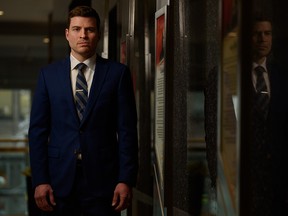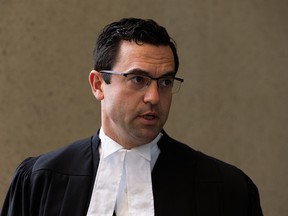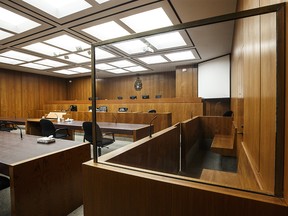 Alberta has the most regressive labour laws in Canada. It long ago banned hospital workers, including nurses, right to strike. That of course did not stop those workers from going on strike. The right to strike is an essential workers right and is defended by the International Labour Organization as such. It is as essential as the right to unionize.
Alberta has the most regressive labour laws in Canada. It long ago banned hospital workers, including nurses, right to strike. That of course did not stop those workers from going on strike. The right to strike is an essential workers right and is defended by the International Labour Organization as such. It is as essential as the right to unionize.
If governments banned the right to unionize it would be seen as the actions of an authoritarian state. The same goes for banning the right to strike. Ironically unions were banned in the 19th Century as 'criminal conspiracies' to limit trade. It was several years after Canada became a nation that Britain changed its laws and Canada followed suit. That did not stop workers from organizing unions, as secret societies; like the Knights of Labor. It meant workers on the job organized, and went on strike because that is their right as workers. All we have to sell is our labour or our time, our presence on the job.
In Alberta hospital workers were declared an essential service that still did not prevent AUPE or the Nurses union from going out on 'illegal' strikes. And win wage and benefit gains.
In Nova Scotia the hospital employers are running TV ads, I have satellite so I get to see them when I watch the CFL or NHL on CBC Halifax, claiming it hurt patients and is in everyones 'best' interest to end the right to strike. They claim other provinces do it and it has brought labour peace. Actually they meant to say appeasement. However that being said these employers are just another arm of government. They are government appointees or hirelings. So while one arm of the government, the legislature, brings in anti-worker anti-union anti-strike laws the other arm of the government, its employer association running the public hospitals, does the PR for the law.
The fact is that if the employer, who is the government, would fund hospitals and medical services properly then workers would be assured of proper wage and benefit increases, and proper hours of work. Instead the employer, which is the government, wants to cut wages, benefits and contract out work, split shifts, end seniority etc. etc.
A group that does not face these draconian attacks is of course the Doctors who are a business monopoly. There are few doctors strikes in Canada, and if they do occur they are short lived because governments assure doctors their services are paid for. Then they turn around and cut services in hospitals and cut other workers wages and benefits and tell them to hold the line.
The reality is that mediation only works between equals. In this case the government and its hospital administration view doctors as indispensable, and other workers as dispensable. If they didn't they would fund hospitals fully so all workers got the pay, benefits and hours of work they deserve. If that was the case there would be no need to strike.
Mediation does not work. Nor does denying workers the right to strike. They will, as history has shown, strike when they get cheated and screwed whether it is against the law or not.
What is interesting is that this balanced and pro-union article is from a Business Journal.
Union Dues: Anti-strike bill 'political posturing'
BY BRIAN FLINN, TRANSCONTINENTAL MEDIA
The Nova Scotia Business Journal
Health workers, the NDP and the Liberals are lined up against the government's highest-profile bill as the Nova Scotia legislature ends a seven-month summer break. Premier Rodney MacDonald said he's pushing ahead with the doomed anti-strike legislation because Nova Scotians deserve to hear it debated and find out how their MLAs vote. But he's not putting his minority government's survival on the line.
"There won't be any confidence votes this fall," MacDonald told reporters.
The government has been working on a bill to replace health strikes with arbitration since a brief IWK walkout earlier this year. Health- and community-care workers don't want to lose collective bargaining rights, and plan to rally outside Province House today while Lt.-Gov. Mayann Francis reads the speech from the throne.
"We're pleased the opposition will defeat this bill," said Joan Jessome, president of the Nova Scotia Government and General Employees Union. "But it can come back again and again. We need to make our point strong and clear enough to put this to rest."
The premier said he does plan to revive the bill later. "I'm a patient person," he said.
Both the Liberals and the NDP plan to defeat the bill at the first opportunity, when it goes to a second reading vote. MacDonald said the Liberals are "stuck in the past," while the NDP is standing up for special interests.
"They receive a lot of funding from the unions. They generally tend to be the biggest contributor to the NDP and most of their candidates," he said. "It's unfortunate; you don't put that ahead of health and safety."
NDP Leader Darrell Dexter said MacDonald is trying to distract attention from bigger problems in health care, such as emergency-room closings and the shortage of nursing-home beds. He said it's unfortunate the government is wasting some of the few days it allows the legislature to sit, on a doomed bill. "This bill is purely a product of political posturing," Dexter said.
Liberal Leader Stephen McNeil said he doesn't hear Nova Scotians pleading for anti-strike legislation. He said his party wants to co-operate with health workers, not take away their rights. "Where's the crisis?" McNeil asked. "I have yet to understand why the premier and the government are hanging their hats on this issue."
The House has to sit for only two days to avoid the label of the laziest legislature in Canada for a fourth year in a row. Prince Edward Island's House sat just 24 days this year, one more than Nova Scotia. – The Daily News
EXTRA: Strike threats useful warning system
By Brian Flinn, Transcontinental Media
Taking the right to strike away from health workers would damage an important safety mechanism and jeopardize the care of Nova Scotians, according to a new study by the Centre for Policy Alternatives.
Saint Mary's University professors Judy and Larry Haiven wrote that health workers know when the system is being pushed beyond tolerable limits and can signal it by threatening to strike. They said it's similar to the "red cord" used to stop assembly lines when something goes wrong in a factory.
"Health-care workers must have a way of indicating that the conditions under which they work do not overstress them or the quality of health-care delivery," the Haivens wrote. "Thus, in the health-care system, the red cord can be said to be the power of health-care workers to threaten to, and if necessary, withhold their labour."
Labour Minister Mark Parent has argued a modern health-care system cannot tolerate work stoppages. The report says "management by stress" now predominates in health care, and an outlet is more important than ever. "If politicians and health-care administrators insist on running a system so close to the bone, then the ability of workers to strike, to pull the red cord, as it were, is an essential system mechanism to ensure patient safety in the long run." – The Daily News
And this is from the Dominion BlogNovember 23, 2007
In one of the more polite demonstrations I've attended, a union coalition lead by the Nova Scotia General Employees Union staged a sidewalk rally of about 500 in front of the province's legislature on Thursday. While members of the crowd, which included a strong contingent of nurses and healthcare workers, heckled Premier Rodney Macdonald's minority government (top pic), the military guard-laden arrival of Nova Scotia's Lt.-Gov Mayann Francis, due to read her first speech from the throne, on the other side of the building was met with no interruption (bottom pic). After Macdonald's assertion that the unions were being "disrespectful" for holding a demonstration during the ceremonial speech from the throne, the union leadership responded by urging demonstrators to remain quiet outside of the legislature while Francis made her speech.
The rally was called in response to a bill due to be introduced by the minority tories banning the right to strike for the 32,000 healthcare workers in Nova Scotia. Macdonald had promised to introduce the bill in May following a one-day strike at a children's hospital in Halifax. The bill seems to be on the verge of being junked as a result of the union campaign, as both the Liberals and NDP have pledged to vote against it, were it to be introduced by the minority government. As a result, Macdonald has admitted he is unwilling to see his government fall as a result of the proposed anti-strike legislation.
Regardless of this apparent defeat, the throne speech outlined the Tory government's plans to establish more publicly funded, private health facilities in the province.
Find blog posts, photos, events and more off-site about:
health care, medicare, Canada, Conservatives, hospital workers, health, Rodney MacDonald, right to strike, unions, Nova Scotia


















